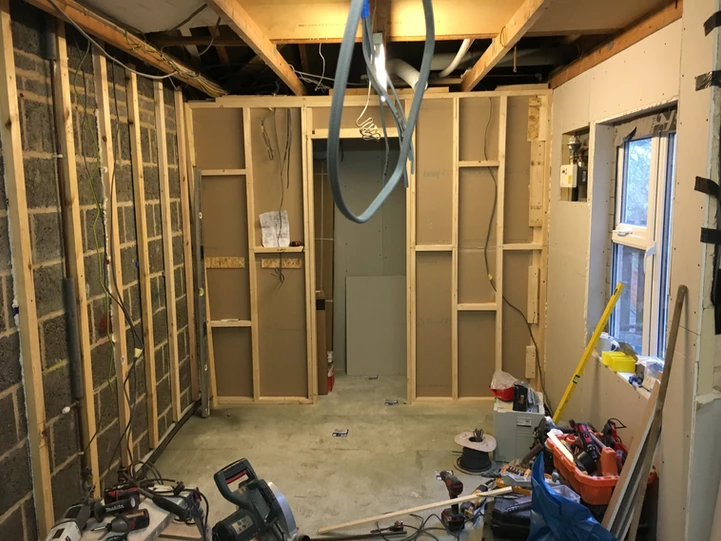Garage conversions are one of the most practical and cost-effective ways to transform unused or underused space into a valuable part of your home. Instead of letting your garage gather dust or act solely as storage, you can turn it into a functional room that meets your lifestyle needs.
From cosy guest suites and home offices to gyms or playrooms, conversions offer a wide range of possibilities. They allow you to make the most of your existing property footprint without the need for a costly extension, making them an attractive option for many homeowners.
In recent years, garage conversions have become increasingly popular across the UK as more people look to adapt their homes to suit flexible working arrangements, growing families, or changing hobbies. With the right design and professional expertise, a converted garage can add both practicality and long-term value to your property.
Why Converting Your Garage is a Smart Investment
A garage being converted is not just about gaining extra space. It is also one of the most financially rewarding home improvements you can make. By transforming an unused garage into a functional living area, you can significantly increase your property’s market value. Estate agents often highlight that a well-executed garage conversion can add up to 15% to the value of a home, making it an appealing choice for those planning to sell in the future.
Unlike larger building projects, conversions usually require less time and money to complete, meaning you can enjoy the benefits sooner without the disruption of major construction. They also make use of your existing structure, which helps reduce costs on foundations and walls, while still providing the opportunity for a completely new interior design.
In addition to financial returns, garage conversions offer lifestyle benefits. They can be tailored to meet your personal needs, whether that is a home office, an extra bedroom, a gym, or a creative studio. With more people working from home and seeking adaptable living arrangements, this type of conversion has become even more desirable.
Investing in a conversion is about maximising the potential of your property. It improves daily living, appeals to future buyers, and offers an affordable way to achieve a more spacious and functional home without having to move.
Popular Uses for a Garage Conversions
A conversion is not just about gaining extra space. It is also one of the most financially rewarding home improvements you can make. By transforming an unused garage into a functional living area, you can significantly increase your property’s market value. Estate agents often highlight that a well-executed garage conversion can add up to 15% to the value of a home, making it an appealing choice for those planning to sell in the future.
Unlike larger building projects, conversions usually require less time and money to complete, meaning you can enjoy the benefits sooner without the disruption of major construction. They also make use of your existing structure, which helps reduce costs on foundations and walls, while still providing the opportunity for a completely new interior design.
In addition to financial returns, conversions offer lifestyle benefits. They can be tailored to meet your personal needs, whether that is a home office, an extra bedroom, a gym, or a creative studio. With more people working from home and seeking adaptable living arrangements, this type of conversion has become even more desirable.
Investing in a garage conversion is about maximising the potential of your property. It improves daily living, appeals to future buyers, and offers an affordable way to achieve a more spacious and functional home without having to move.

Key Considerations Before Starting
Before committing to a conversion, it is important to understand the practical and legal requirements involved. Careful planning will help ensure your project runs smoothly and meets all necessary standards.
The first step is to check whether you need planning permission. Many conversions fall under Permitted Development rights, meaning formal permission is not required. However, this is not always the case, especially if you live in a conservation area, own a listed building, or plan to alter the building’s exterior.
Building regulations approval is almost always required. This ensures your conversion meets standards for safety, energy efficiency, ventilation, insulation, and structural stability. It also covers fire safety measures and compliance with accessibility requirements where applicable.
Consider the structural implications of removing garage doors and altering walls. You may need additional support beams or reinforcements to maintain the integrity of the building. Waterproofing and insulation are crucial to prevent dampness and ensure the space is comfortable year-round.
Access and natural light are also important factors. You may wish to replace the garage door with windows or a fully glazed wall to make the space feel brighter and more inviting.
Lastly, think about the purpose of the conversion and how it will fit into your overall home layout. A well-designed garage conversion should not only add space but also improve the functionality and flow of your home.
Cost Breakdown of a Garage Conversion
The cost of a converting your garage can vary depending on factors such as the size of the garage, the complexity of the work, and the quality of the materials you choose. Understanding the typical expenses involved will help you set a realistic budget and avoid surprises.
Labour Costs
Labour is often the largest part of the budget. Skilled tradespeople, including builders, electricians, and plumbers, will be required to carry out the work. In the UK, a standard single garage conversion can range from £1,000 to £1,500 per square metre, depending on the specification.
Materials and Finishes
Materials will include insulation, flooring, windows, doors, plasterboard, and paint. The type and quality of finishes you select can significantly influence the total cost. High-end flooring or bespoke joinery will increase the budget, while more modest choices can help control expenses.
Structural Changes
If your project requires removing load-bearing walls or adding structural supports, this will add to the cost. Replacing the garage door with a window or wall section, and ensuring the façade blends with the rest of the property, may also involve additional work.
Plumbing and Electrical Work
Installing new electrical points, lighting, and heating is standard for most conversions. If you plan to include a bathroom or kitchen area, plumbing costs will be higher, particularly if connections need to be extended from elsewhere in the house.
Potential Hidden Costs
You should also budget for unexpected issues, such as damp-proofing, upgrading outdated wiring, or addressing poor foundations. Setting aside 10–15% of your total budget for contingencies is a sensible approach.
A well-planned conversion can offer excellent value for money, delivering a versatile new space while potentially increasing the overall market value of your home.
MCA Design’s Approach to Garage Conversions
At MCA Design, we take a tailored approach to every conversion, ensuring the end result reflects both the practical needs and style preferences of our clients. From the first conversation, we listen carefully to your ideas and assess how best to transform your unused garage into a space that truly adds value to your home.
Our process begins with a detailed consultation and site survey. This allows us to understand the structural condition of your garage, discuss your intended use for the space, and identify any planning or building regulation requirements. We then develop a design that balances functionality with aesthetics, making the most of the available space and natural light.
Once the plans are finalised, our experienced team manages the entire process – from securing approvals to coordinating skilled tradespeople. We keep you informed every step of the way, ensuring the project runs smoothly and stays within budget.
With MCA Design, you can be confident your conversion will be completed to the highest standard, on time, and with minimal disruption to your home. Our goal is to create a finished space that not only meets your needs but exceeds your expectations.
Garage Conversions: FAQS

Do I need planning permission for a conversion?
In many cases, conversions fall under Permitted Development rights, meaning you do not need full planning permission. However, if your property is in a conservation area, is a listed building, or you plan to change the structure significantly, formal permission may be required.
How much does a garage conversion cost?
Costs vary depending on the size of the garage, the complexity of the design, and the intended use of the space. On average, you can expect to budget between £10,000 and £20,000, although high-spec finishes or structural changes may increase this.
How long does a conversion take?
Most conversions are completed within three to six weeks. The exact timescale depends on the scope of work, availability of materials, and any planning or regulation processes involved.
Will a garage conversion add value to my home?
Yes, in most cases. A well-designed conversion can add significant value by increasing usable living space, making your home more attractive to potential buyers.
For the best results, always work with experienced professionals who can guide you through the process and ensure the work meets all regulations.








